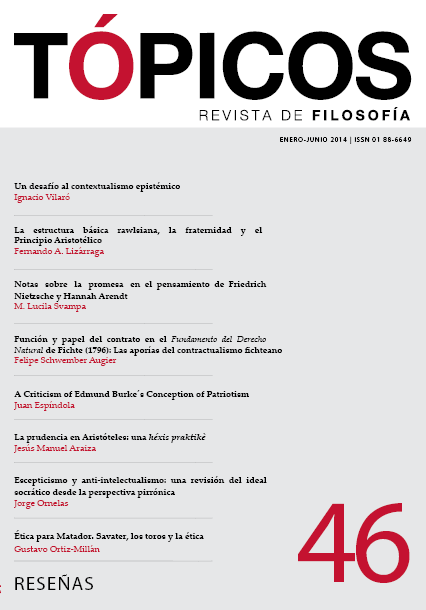Publicado 2014-06-27
Palabras clave
- Edmund Burke,
- patriotismo,
- emociones,
- Jürgen Habermas.
Cómo citar
Resumen
Este artículo se apoya en la literatura sobre el papel de las emociones en la filosofía de Edmund Burke para caracterizar su concepción del patriotismo, y para entender cómo se relaciona con otras dimensiones de su pensamiento político y estético. Más importante aún, el artículo rechaza la idea de que el patriotismo Burkeano (y su anclaje en una teoría particular de las emociones) sirva como base para articular una visión cosmopolita de la política. El trabajo hace una crítica de la concepción Burkeana del patriotismo a partir de una comparación de éste con algunas concepciones más recientes sobre el fenómeno. Primero, el artículo pone de relieve la afinidad del patriotismo Burkeano con la versión moralmente inaceptable de Alasdair MacIntyre. Después muestra su incompatibilidad con versiones menos objetables como la de Jürgen Habermas.
Referencias
- Arendt, Hannah, The Human Condition (Chicago: The University of Chicago, 1958).
- Bass, Jeff, “The Perversion of Empire: Edmund Burke and the Nature of Imperial Responsibility,” Quarterly Journal of Speech 81(2), 1995.
- Burke, Edmund, “Thoughts on French Affairs,” in The Works of the Right Honourable Edmund Burke, 16 vols. (London: Rivington, 1822).
- ––. “Speeches of Mr. Burke on the Impeachment of Warren Hastings, Esq., 16. Feb. 1788,” in The Works of the Right Honourable Edmund Burke (Boston: Wells and Lilly-Courty Street), 1827. 16 vols.
- ––. Select Works of Edmund Burke. A New Imprint of the Payne Edition. Foreword and Biographical Note by Francis Canavan (Indianapolis: Liberty Fund, 1999). Vol. 4. Chapter: “Speech on the Reform of the Representation of the Commons in Parliament.” Accessed from http://oll.libertyfund.org/title/659/20394/1385323 on 2014-02-10
- ––. A Philosophical Enquiry into the Origin of our Ideas of the Sublime and the Beautiful (New York: Oxford University Press, 1998).
- ––. Reflections on the Revolution in France, in Select Works of Edmund Burke (Indianapolis: Liberty Fund, 1999).
- Chiba, Shin, “Hannah Arendt on Love and the Political: Love, Friendship, and Citizenship,” The Review of Politics 57:3 (1995).
- Corbett, Mary Jean, “Public Affections and Familial Politics: Burke, Edgeworth, and the ‘Common Naturalization’ of Great Britain,” ELH 61, 4 (Winter 1994).
- Czobor-Lupp, Mihaela, “Herder on esthetic imagination as a source of post-national democratic solidarity: A contribution to Habermas’ constitutional patriotism,” Contemporary Political Theory (2013) 12.
- De Tocqueville, Alexis, Democracy in America (George Lawrence, trans. USA: Harper & Row, 1988).
- Deane, Seamus, Foreign Affections (Notre Dame: University of Notre Dame Press, 2005).
- Elster, Jon, Alchemies of the Mind: Rationality and the Emotions (Cambridge: Cambridge University Press, 1999).
- Forst, Rainer, Contexts of Justice. Political Philosophy beyond Liberalism and Communitarianism (Berkeley: University of California Press, 2002).
- Frohnen, Bruce, Virtue and the Promise of Conservatism: The Legacy of Burke and Tocqueville (Kansas: University Press of Kansas, 1993).
- Habermas, Jürgen, Between Facts and Norms: Contributions to a Discourse Theory of Law and Democracy (Cambridge: MIT Press, 1992).
- ––. The New Conservatism: Cultural Criticism and the Historian’s Debate (Cambridge: MIT Press, 1992).
- Hall, Lauren, “Rights and the Heart: Emotions and Right Claims in the Political Theory of Edmund Burke,” The Review of Politics 73 (2011).
- Herzog, Don, Poisoning the Minds of the Lower Orders (New Jersey: Princeton University Press, 1999).
- Hume, David, A Treatise of Human Nature (Oxford: Oxford University Press, 2000).
- James, Susan, “Passions and Politics,” in Anthony Hatzimoysis, ed. Philosophy and the Emotions (Cambridge: Cambridge University Press, 2003).
- ––. “The Politics of Emotion: Liberalism and Cognitivism,” Anthony O’Hear, ed., Political Philosophy (Cambridge: Cambridge University Press, 2006).
- Kramnick, Isaac, The Rage of Edmund Burke (New York: Basic Books, 1977).
- MacIntyre, “Is Patriotism a Virtue?,” in I. Primoratz (ed.), Patriotism (Amherst: Humanity Books, 2002).
- MacIntyre, Alasdair, After Virtue. A Study in Moral Theory (Notre Dame: University of Notre Dame, 1981).
- Nathanson, Stephen, “In Defense of ´Moderate Patriotism´,” in I. Primoratz (ed.), Patriotism.
- Nussbaum, Martha, The Therapy of Desire. Theory and Practice in Hellenistic Ethics (Princeton: Princeton University Press, 1996).
- ––. Upheavals of Thought. The Intelligence of Emotions (Cambridge: Cambridge University Press, 2001).
- ––. “Can Patriotism be Compassionate?,” The Nation, December 2001.
- Oakeshott, Michael, Rationalism in Politics (Indianapolis: Liberty Fund, 1991).
- Primoratz, Igor and Aleksandar Pavkovic (eds.), Patriotism: Philosophical and Political Perspectives (Aldershot: Ashgate Publishing, 2008).
- Radcliffe, Evan, “Burke, Radical Cosmopolitanism, and the Debates on on Patriotism in the 1790s,” Studies in Eighteenth Century Culture (28), 1999.
- Singh, Uday Metha, Liberalism and Empire: A Study of NineteenthCentury British Liberal Thought (Chicago: University of Chicago Press, 1999).
- Smith, Brian, “Edmund Burke, the Warren Hastings Trial, and the Moral Dimension of Corruption,” Polity 40(1), 2008.
- Stryer, Steven, “Burke’s Vehemence and the Rhetoric of Historical Exaggeration,” Rhetorica: A Journal of the History of Rhetoric, 30(2).
- Tarnopolsky, Christina, “Prudes, Perverts, and Tyrants. Plato and the Contemporary Politics of Shame,” Political Theory 32 (4): 2004.
- Tully, James (ed.), Meaning and Context: Quentin Skinner and His Critics (Princeton: Princeton University Press, 1988).
- Werner-Müller, Jan, “On the Origins of Constitutional Patriotism,” Contemporary Political Theory 5 (2006).
- White, Stephen, Edmund Burke: Modernity, Politics, Aesthetics (Oxford: Rowman & Littlefield Publishers, 2002).
- Wolin, Sheldon, “Hume and Conservatism,” APSR 48 (4), 1954.
- Zerrili, Linda, Signifying Women. Culture and Chaos in Rousseau, Burke, and Mill (Ithaca: Cornell University Press, 1994).






